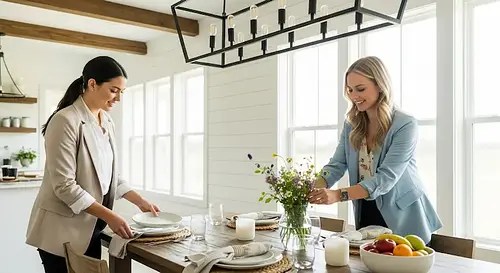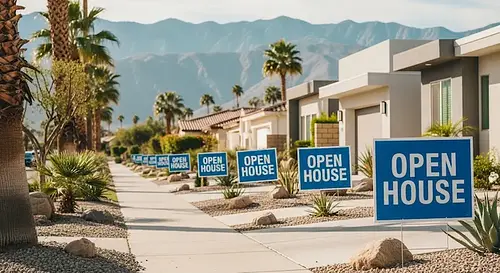Open House Automation: A Primer For Modern Real Estate Agents
Open house automation is changing the game for real estate agents. In this complete guide, you’ll learn how to automate every part of your open house—from digital sign-ins and CRM integration to personalized follow-up and performance tracking. Discover the best tools, strategies, and workflows to capture more leads, close more deals, and scale your business with less effort.

Written by Seth Cox
Jun 21, 2025 / Open house marketing
Whether you're a solo agent hosting one open house a month or part of a growing team managing multiple events each weekend, automation helps you deliver a seamless experience every time. No more paper sign-in sheets, missed follow-ups, or wondering which events actually performed well.
This guide will walk you through everything you need to know about real estate open house automation: what it is, how it works, and the exact tools top-producing agents are using to turn open houses into repeatable, lead-generating systems. If you’re ready to save time, boost conversion rates, and scale your business—keep reading.

What Is Open House Automation?
Why Open House Automation Matters for Real Estate Agents
- Capture every visitor with mobile sign-in forms or QR codes
- Instantly sync new contacts with your CRM
- Send personalized follow-up emails and texts automatically
- Track which open houses generate the most leads
- Spend more time selling and less time on logistics
Manual vs. Automated Open Houses
The 6 Stages of a Fully Automated Open House
1. Scheduling and Promotion
- Auto-schedule open houses and instantly display them online
- Push new events to your CRM, team dashboard, or client portal
- Generate promotional graphics using tools like Canva
- Send automated reminders to your sphere or email list

2. Digital Sign-In and Lead Capture
- Allow guests to sign in via tablet, phone, or QR code
- Collect names, emails, phone numbers, and buying timeline
- Capture every lead without chasing down handwriting
- Require sign-in before entering (with polite scripting)
3. CRM Sync and Contact Routing
- Auto-sync with CRMs like Follow Up Boss, kvCORE, or Chime
- Add lead tags like “Open House – 123 Main St”
- Route leads to specific agents based on listing ownership
- Trigger smart campaigns without lifting a finger
4. Personalized Follow-Up (That Feels Human)
- Send instant thank-you emails or texts
- Deliver property info and additional listings based on guest interests
- Trigger longer-term drips for colder leads
- Customize templates with smart fields (name, property, etc.)
5. Team Notifications and Workflow Automation
- Notify listing agents or ISAs when a new lead signs in
- Assign follow-up tasks automatically
- Use role-based permissions to streamline collaboration
- Reduce admin time for coordinators and TCs
📌 Further Reading: How to automate open house notifications across your real estate team
6. Reporting and Performance Tracking
- Track number of leads per open house
- See which agents are capturing the most contacts
- Identify your highest-performing listings
- Create polished reports to share with sellers
📌 Further Reading: Introduction to Open House Reporting
This is where automation becomes more than a convenience—it becomes a competitive advantage. When your open house process is fully automated, you can scale your efforts without sacrificing quality or personalization.

The Best Tools for Open House Automation
All-in-One Systems vs. Piecemeal Workflows
An all-in-one open house platform saves time, reduces friction, and helps you stay consistent across every event.
- Fewer logins, fewer mistakes
- Built-in integrations that sync automatically
- One place to train your team and manage your events
What to Look for in Open House Automation Tools
- Mobile sign-in experience (with QR code support)
- CRM integrations with routing and tagging
- Automated email and SMS follow-up
- Customizable workflows for solo agents or teams
- Reporting dashboards for performance insights
- Role-based access for admins, hosts, and listing agents
Why Showable Is Built for Open House Automation
- Designed for teams and solo agents alike
- Integrates with your CRM and calendar
- Built-in lead routing and reporting
- No technical setup or learning curve
📌 Want to see it in action? Explore Showable’s features with our free plan

Open House Automation Use Cases (With Real Examples)
Solo Agent Scaling Up Without an Assistant
- Instantly capture and tag leads without any manual input
- Automatically send personalized follow-ups to every guest
- Focus on conversations during the open house—not admin afterward
Real Estate Team Streamlining Open House Operations
- Listing coordinators schedule and assign events with one dashboard
- Guest hosts log in and access property notes and sign-in tools
- Leads are routed to the right agent automatically, with no delays
Result: A midsize team in Florida increased open house lead conversion by 45% and cut admin time in half.
Brokerage Standardizing Events Across Dozens of Agents
- Provide agents with ready-to-go automation templates
- Track performance across the entire office
- Ensure consistent branding, messaging, and follow-up
Result: A regional brokerage used Showable to centralize open house data, train new agents faster, and improve seller reporting across a multitude of listings.
These aren’t just time-saving stories—they’re effective open house strategies. When your open house process is automated, you're free to focus on relationships, negotiations, and closing deals.

How to Get Started with Open House Automation
Step-by-Step Workflow to Launch Your First Automated Open House
- Choose an all-in-one platform
- Select a tool built specifically for real estate open houses. Look for features like mobile sign-in, CRM integrations, and automated follow-up.
- Set up your templates
- Customize your sign-in form, follow-up emails, and reminders. Save them as reusable templates for future events.
- Integrate with your CRM
- Connect your tool to Follow Up Boss, Chime, kvCORE, or whatever CRM you use. Make sure lead tags and routing rules are in place.
- Schedule your open house. Ensure you schedule your open house at the best time and day for max ROI.
- Enter the details of your upcoming event. The platform should automatically generate a sign-in link, promotional content, and reminder settings.
- Go live—and test it out
- Before guests arrive, test the full flow: sign in as a guest, verify CRM sync, and review the automated follow-up.
Tips for a Smooth Transition to Automation
- Audit your current manual steps and replace them one at a time
- Start with low-stakes listings or vacant homes to test the process
- Train your team gradually, introducing automation one feature at a time
- Gather feedback from guests and agents to optimize the experience
You’ll be surprised how quickly open house automation becomes second nature—and how much time and opportunity you’ve been leaving on the table.

Common Mistakes to Avoid with Open House Automation
Overcomplicating Your Tech Stack
Keep it simple: Choose one platform that handles everything from sign-in to follow-up in a single place.
Forgetting to Personalize the Follow-Up
Pro tip: Use smart fields to automatically insert names, property addresses, and visit dates.
Not Reviewing the Reports
Automating Without a Clear Strategy
Avoid these pitfalls, and you’ll create an automation system that feels smart, seamless, and perfectly in sync with how you already do business—only faster and more effective.
FAQs About Open House Automation
What does open house automation actually include?
Do I need a CRM to use automation tools?
Will automation make my follow-up feel impersonal?
Can solo agents benefit from open house automation, or is it just for teams?
How much does open house automation cost?

Conclusion: Work Smarter, Not Harder
Whether you’re a solo agent trying to grow your pipeline or a team leader looking to scale operations, automation gives you the structure, speed, and consistency you need to stand out. It’s not about replacing the personal touch—it’s about making it repeatable.
Ready to put your open house strategy on autopilot? Try Showable free and experience the platform that real estate pros use to automate their entire open house process—from scheduling to follow-up.






